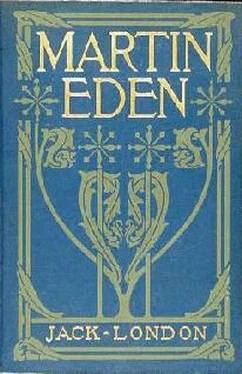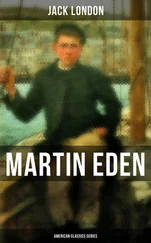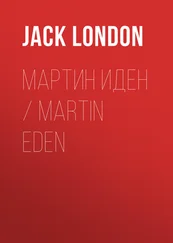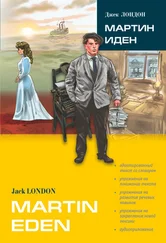"And there’s another fellow-Parry-an Australian, a statistician and a sporting encyclopaedia. Ask him the grain output of Paraguay for 1903, or the English importation of sheetings into China for 1890, or at what weight Jimmy Britt fought Battling Nelson, or who was welter-weight champion of the United States in ’68, and you’ll get the correct answer with the automatic celerity of a slot-machine. And there’s Andy, a stone-mason, has ideas on everything, a good chess-player; and another fellow, Harry, a baker, red hot socialist and strong union man. By the way, you remember Cooks’ and Waiters’ strike-Hamilton was the chap who organized that union and precipitated the strike-planned it all out in advance, right here in Kreis’s rooms. Did it just for the fun of it, but was too lazy to stay by the union. Yet he could have risen high if he wanted to. There’s no end to the possibilities in that man-if he weren’t so insuperably lazy."
Brissenden advanced through the darkness till a thread of light marked the threshold of a door. A knock and an answer opened it, and Martin found himself shaking hands with Kreis, a handsome brunette man, with dazzling white teeth, a drooping black mustache, and large, flashing black eyes. Mary, a matronly young blonde, was washing dishes in the little back room that served for kitchen and dining room. The front room served as bedchamber and living room. Overhead was the week’s washing, hanging in festoons so low that Martin did not see at first the two men talking in a corner. They hailed Brissenden and his demijohns with acclamation, and, on being introduced, Martin learned they were Andy and Parry. He joined them and listened attentively to the description of a prize-fight Parry had seen the night before; while Brissenden, in his glory, plunged into the manufacture of a toddy and the serving of wine and whiskey-and-sodas. At his command, "Bring in the clan," Andy departed to go the round of the rooms for the lodgers.
"We’re lucky that most of them are here," Brissenden whispered to Martin. "There’s Norton and Hamilton; come on and meet them. Stevens isn’t around, I hear. I’m going to get them started on monism if I can. Wait till they get a few jolts in them and they’ll warm up."
At first the conversation was desultory. Nevertheless Martin could not fail to appreciate the keen play of their minds. They were men with opinions, though the opinions often clashed, and, though they were witty and clever, they were not superficial. He swiftly saw, no matter upon what they talked, that each man applied the correlation of knowledge and had also a deep-seated and unified conception of society and the Cosmos. Nobody manufactured their opinions for them; they were all rebels of one variety or another, and their lips were strangers to platitudes. Never had Martin, at the Morses’, heard so amazing a range of topics discussed. There seemed no limit save time to the things they were alive to. The talk wandered from Mrs. Humphry Ward’s new book to Shaw’s latest play, through the future of the drama to reminiscences of Mansfield. They appreciated or sneered at the morning editorials, jumped from labor conditions in New Zealand to Henry James and Brander Matthews, passed on to the German designs in the Far East and the economic aspect of the Yellow Peril, wrangled over the German elections and Bebel’s last speech, and settled down to local politics, the latest plans and scandals in the union labor party administration, and the wires that were pulled to bring about the Coast Seamen’s strike. Martin was struck by the inside knowledge they possessed. They knew what was never printed in the newspapers-the wires and strings and the hidden hands that made the puppets dance. To Martin’s surprise, the girl, Mary, joined in the conversation, displaying an intelligence he had never encountered in the few women he had met. They talked together on Swinburne and Rossetti, after which she led him beyond his depth into the by-paths of French literature. His revenge came when she defended Maeterlinck and he brought into action the carefully-thought-out thesis of "The Shame of the Sun."
Several other men had dropped in, and the air was thick with tobacco smoke, when Brissenden waved the red flag.
"Here’s fresh meat for your axe, Kreis," he said; "a rose-white youth with the ardor of a lover for Herbert Spencer. Make a Haeckelite of him-if you can."
Kreis seemed to wake up and flash like some metallic, magnetic thing, while Norton looked at Martin sympathetically, with a sweet, girlish smile, as much as to say that he would be amply protected.
Kreis began directly on Martin, but step by step Norton interfered, until he and Kreis were off and away in a personal battle. Martin listened and fain would have rubbed his eyes. It was impossible that this should be, much less in the labor ghetto south of Market. The books were alive in these men. They talked with fire and enthusiasm, the intellectual stimulant stirring them as he had seen drink and anger stir other men. What he heard was no longer the philosophy of the dry, printed word, written by half-mythical demigods like Kant and Spencer. It was living philosophy, with warm, red blood, incarnated in these two men till its very features worked with excitement. Now and again other men joined in, and all followed the discussion with cigarettes going out in their hands and with alert, intent faces.
Idealism had never attracted Martin, but the exposition it now received at the hands of Norton was a revelation. The logical plausibility of it, that made an appeal to his intellect, seemed missed by Kreis and Hamilton, who sneered at Norton as a metaphysician, and who, in turn, sneered back at them as metaphysicians. Phenomenon and noumenon were bandied back and forth. They charged him with attempting to explain consciousness by itself. He charged them with word-jugglery, with reasoning from words to theory instead of from facts to theory. At this they were aghast. It was the cardinal tenet of their mode of reasoning to start with facts and to give names to the facts.
When Norton wandered into the intricacies of Kant, Kreis reminded him that all good little German philosophies when they died went to Oxford. A little later Norton reminded them of Hamilton’s Law of Parsimony, the application of which they immediately claimed for every reasoning process of theirs. And Martin hugged his knees and exulted in it all. But Norton was no Spencerian, and he, too, strove for Martin’s philosophic soul, talking as much at him as to his two opponents.
"You know Berkeley has never been answered," he said, looking directly at Martin. "Herbert Spencer came the nearest, which was not very near. Even the stanchest of Spencer’s followers will not go farther. I was reading an essay of Saleeby’s the other day, and the best Saleeby could say was that Herbert Spencer nearly succeeded in answering Berkeley."
"You know what Hume said?" Hamilton asked. Norton nodded, but Hamilton gave it for the benefit of the rest. "He said that Berkeley’s arguments admit of no answer and produce no conviction."
"In his, Hume’s, mind," was the reply. "And Hume’s mind was the same as yours, with this difference: he was wise enough to admit there was no answering Berkeley."
Norton was sensitive and excitable, though he never lost his head, while Kreis and Hamilton were like a pair of cold-blooded savages, seeking out tender places to prod and poke. As the evening grew late, Norton, smarting under the repeated charges of being a metaphysician, clutching his chair to keep from jumping to his feet, his gray eyes snapping and his girlish face grown harsh and sure, made a grand attack upon their position.
"All right, you Haeckelites, I may reason like a medicine man, but, pray, how do you reason? You have nothing to stand on, you unscientific dogmatists with your positive science which you are always lugging about into places it has no right to be. Long before the school of materialistic monism arose, the ground was removed so that there could be no foundation. Locke was the man, John Locke. Two hundred years ago-more than that, even in his ‘Essay concerning the Human Understanding,’ he proved the non-existence of innate ideas. The best of it is that that is precisely what you claim. To-night, again and again, you have asserted the non-existence of innate ideas.
Читать дальше












